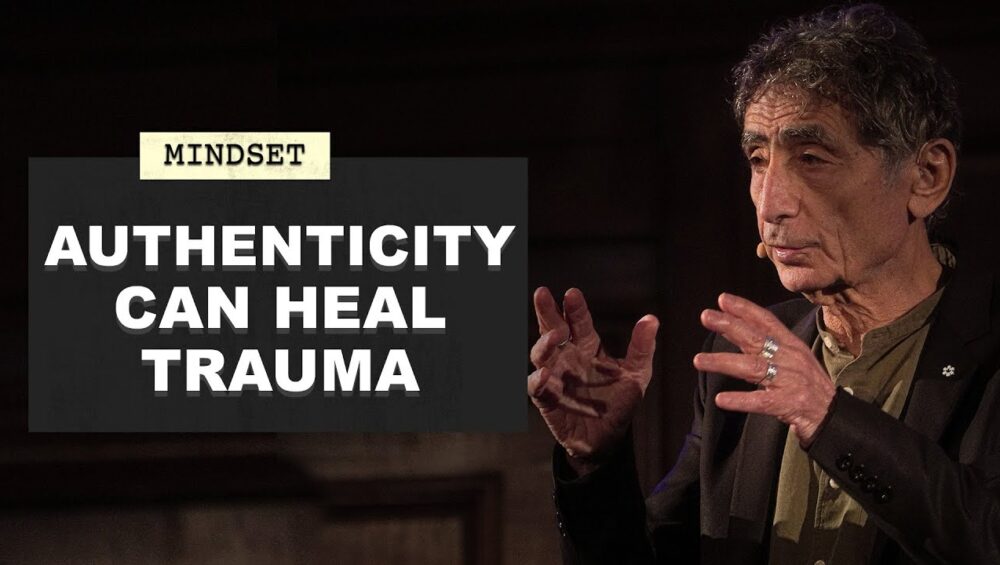In his groundbreaking book The Myth of Normal: Trauma, Illness, and Healing in a Toxic Culture, renowned physician Dr. Gabor Maté explores the deep connection between authenticity and healing. He argues that many of our modern afflictions—whether physical, emotional, or psychological—arise from a disconnection from our true selves. By examining the roots of trauma and the societal pressures that cause us to suppress our authenticity, Maté presents a compelling case for reclaiming our true selves as a path to healing.
Suppression of Authenticity: A Survival Mechanism
From early childhood, individuals often learn to prioritize external expectations over inner truths. This adaptation acts as a survival mechanism in environments where authenticity may be met with rejection or punishment, but it can lead to long-term psychological strain. Maté emphasizes that trauma is not solely the result of catastrophic events but can also stem from chronic situations where one’s true feelings and needs are consistently invalidated or ignored.
This chronic suppression leads to a state in which individuals become alienated from their own emotions and desires, fostering a sense of emptiness and disconnection. Over time, this inner void may manifest as anxiety, depression, or even physical illness, as body and mind struggle with the unresolved tension between one’s true self and the facade maintained for external acceptance.
The Role of Social Norms in Shaping Trauma
Modern society often promotes ideals that prioritize productivity, conformity, and superficial success over genuine well-being. In such an environment, individuals may feel compelled to suppress their authentic selves in order to fit into societal molds, leading to a collective disconnection from true identity. Maté argues that this widespread inauthenticity contributes to a culture where trauma becomes normalized and genuine healing remains elusive.
The relentless pursuit of external validation and the stigmatization of vulnerability further exacerbate this issue. When society discourages open expression of emotions and authentic experiences, individuals are left to navigate their inner struggles in isolation, often resorting to unhealthy coping mechanisms that deepen their trauma.
Authenticity and Substance Abuse
Authenticity is a fundamental human need, and being true to oneself is essential. According to Dr. Gabor Maté, trauma arises when we suppress our authenticity and who we truly are. Our human nature is governed by two psychological responses: fight or flight. If we choose flight—or something inauthentic—the resulting trauma can lead to substance abuse, such as alcohol or drugs. The escape into addiction thus becomes a behavioral pattern that can develop into a habit, and eventually, into dependency.
When we create trauma, we choose flight as a survival mechanism. This is universal for both humans and animals and is normal. But the problem with choosing flight is that it is not just an escape from a situation we dislike—it is also a flight from our authenticity and true self. Therefore, reconnecting with our authenticity is the essence of healing from trauma.
Reconnecting with Authenticity: The Path to Healing
According to Maté, healing requires a return to authenticity. This process involves recognizing and embracing one’s true feelings, desires, and experiences—even those that are painful or long-suppressed. By confronting these aspects of the self with compassion and honesty, individuals can begin to mend the fractures caused by years of inauthentic living.
This journey toward authenticity is not without its challenges. It requires individuals to confront societal expectations, familial pressures, and internalized beliefs that have long dictated their behavior. But by committing to this path, one can achieve a sense of wholeness and inner peace that transcends external circumstances.
Practical Steps Toward an Authentic Life
- Self-Reflection: Regularly engage in introspective practices, such as journaling or meditation, to explore and understand your true feelings and desires.
- Conscious Awareness: Develop awareness of moments when you act out of obligation or fear rather than genuine desire, and consider the underlying causes.
- Set Boundaries: Learn to say no to situations or relationships that force you to compromise your authenticity.
- Seek Support: Connect with therapists or support groups that encourage authentic expression and provide a safe space for vulnerability.
- Embrace Vulnerability: Recognize that vulnerability is a strength, not a weakness, and that expressing your true self fosters deeper connections with others.
Conclusion
Dr. Gabor Maté’s insights in The Myth of Normal highlight the profound impact authenticity has on our overall well-being. By understanding how societal norms and personal experiences lead us to suppress our true selves, we can begin to forge a path toward healing that prioritizes genuine self-expression and connection. Embracing authenticity is not merely a personal endeavor but a transformative act that can ripple through society, fostering a culture of empathy, understanding, and holistic health.
See Dr. Gabor Maté’s video on how authenticity can heal trauma here:
